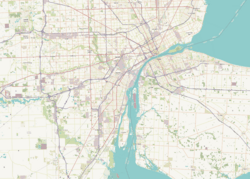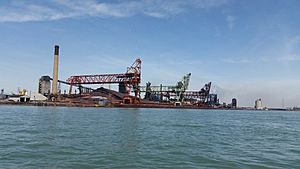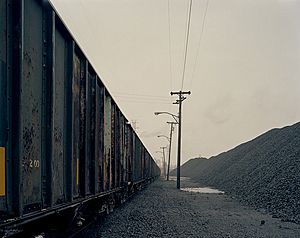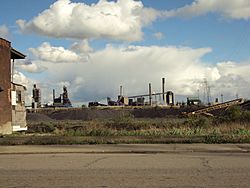Zug Island facts for kids
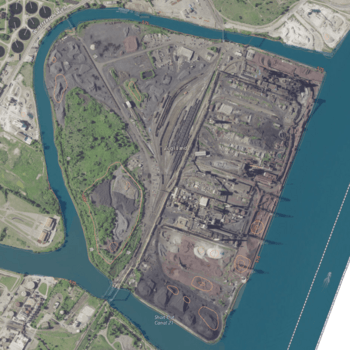
USGS aerial imagery of Zug Island
|
|
|
Zug Island (Michigan)
|
|
| Geography | |
|---|---|
| Location | Detroit River, River Rouge, Michigan, U.S. |
| Coordinates | 42°16′58″N 83°06′41″W / 42.28278°N 83.11139°W |
| Area | 0.93 sq mi (2.4 km2) |
| Highest elevation | 571 ft (174 m) |
| Administration | |
|
United States
|
|
| State | Michigan |
| County | Wayne |
| City | River Rouge |
| Demographics | |
| Population | 0 (permanent) |
Zug Island is a busy industrial area in River Rouge, Michigan. It sits at the southern edge of Detroit in the state of Michigan. The island is located where the River Rouge flows into the Detroit River. Zug Island is not a natural island. It was created when a shipping canal was dug. This canal helped ships travel more easily around a curvy part of the River Rouge.
Contents
How Zug Island Was Formed
From Marsh to Island: A Brief History
For thousands of years, Zug Island was a marshy area. It was a peninsula (land almost surrounded by water) at the mouth of the River Rouge. Native American people used it as a burial ground. When Europeans arrived, this land became part of Ecorse Township.
Interest in developing the land grew in the 1800s. Samuel Zug, a wealthy businessman, bought 325 acres of this marshy land in 1876. He hoped to build a fancy home there. However, the dampness was too much, and his family left after 10 years.
The Canal That Created the Island
In 1888, Samuel Zug allowed a small canal to be dug through his property. This "Short Cut Canal" connected the Rouge River more directly to the Detroit River. In the early 1920s, Henry Ford made this canal much wider. This allowed very large ships to reach the Ford River Rouge Complex.
In 1891, Samuel Zug sold his land for a lot of money. Industries wanted to use it as a place for their factories and to store materials. This is how the peninsula became an island. Samuel Zug later worked in politics before he passed away in 1896.
The Steel Mill on Zug Island
Early Days of Iron Making
In 1901, the Detroit Iron Works brought iron making to Zug Island. They built a large furnace called a blast furnace in 1902. A few years later, in 1904, the M.A. Hanna Company bought the works. They built a second blast furnace in 1909. At that time, these furnaces were said to be the biggest in the world. They made pig iron, which is used to create other metal products.
The plant grew and became part of the Great Lakes Steel Corporation in 1931. It became a key part of a large steel mill. A third blast furnace was added in 1938.
Zug Island's Role in Steel Production
In 2003, United States Steel bought most of the island's facilities. Today, Zug Island is where the steel mill's iron-making happens. The rest of the steel-making and processing takes place a few miles south in Ecorse, Michigan.
The island has three blast furnaces and large areas to store raw materials. Ships bring iron ore to docks along the island's north and east sides. Coal and coke (a type of fuel) are stored on the south and west sides. A company called EES Coke LLC also operates a coke plant on the island.
Iron made on Zug Island is carried by special rail cars to the main steel plant. The coke is shipped by rail to other customers. In the past, thousands of people worked on the island. Today, a few hundred people work there. In 2008, U.S. Steel stopped production due to money problems but restarted in 2009. However, in December 2019, U.S. Steel announced they would stop most operations on Zug Island by April 2020.
Wildlife on the Island
Even though Zug Island is very industrial, some areas are left natural. These areas provide homes for different animals.
- Foxes can be found on the island.
- Peregrine falcons, which were once endangered, also live there. They like to perch on tall structures like the cranes at the ore docks.
- In the Detroit River, there's a special bed of coal cinders. This is a rare place for lake sturgeon to lay their eggs. Lake sturgeon are a threatened species.
- Other animals like gulls, wild cats, and rats also live on the island.
Environmental Concerns
Air Quality Issues
One big concern for the neighborhoods around Zug Island is the air quality. Reports have shown that these areas have some of the most polluted air in Michigan. Residents have reported bad smells and dust in the air. They also worry about health issues like asthma.
The Mysterious Hum
Since 2011, people in Canada and the U.S. have reported hearing and feeling a mysterious "Hum." This low rumbling sound and vibration has been felt up to 50 miles away. Scientists from Canada and Ontario's Ministry of Natural Resources investigated the source.
The city of River Rouge spent money trying to find the source of the hum. They thought it might come from the steel mill on Zug Island. In 2013, a Canadian scientist used special equipment to try to pinpoint the sound.
The study's results came out in 2014. While some news reports said Zug Island was the source, the study actually suggested the hum came from south of the island. Interestingly, reports of the hum stopped after the U.S. Steel plant on Zug Island closed down in April 2020.
Fun Facts About Zug Island
Urban Legends and Pop Culture
Zug Island is mostly closed to the public. This has led to some interesting stories about it.
- Some people believe the island has a prison or jail. This is not true.
- Others think parts of the movie RoboCop were filmed there. The movie mentions Zug Island, but the steel mill scenes were filmed in Pennsylvania.
Famous Ship and Books
- The famous Great Lakes ship, the SS Edmund Fitzgerald, was carrying iron ore for Zug Island when it sank in 1975.
- In 2011, author Gregory Fournier wrote a novel called Zug Island: A Detroit Riot Novel.
Music and the Island
- A Detroit rock band called Zug Izland named themselves after the island. They are known for their "Juggalo Rock" style.
- The music group Insane Clown Posse has also mentioned Zug Island in some of their songs.
As of April 2013[update]
See also
 In Spanish: Isla Zug para niños
In Spanish: Isla Zug para niños
 | Stephanie Wilson |
 | Charles Bolden |
 | Ronald McNair |
 | Frederick D. Gregory |


